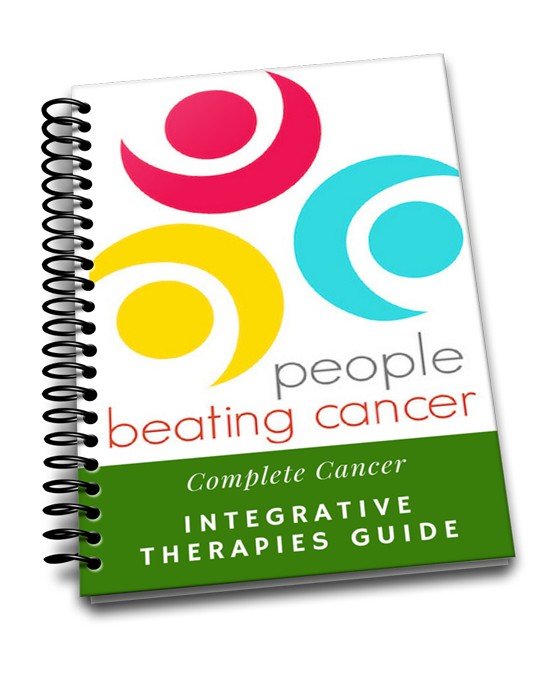Leave a Comment:
3 comments
[…] Anti-angiogenesis Extends Cervical Cancer Survival […]
Reply[…] Anti-angiogenesis Extends Cervical Cancer Survival […]
Reply[…] Anti-angiogenesis Extends Cervical Cancer Survival […]
Reply
Learn about conventional, complementary, and integrative therapies.
Dealing with treatment side effects? Learn about evidence-based therapies to alleviate your symptoms.
Click the orange button to the right to learn more.

The article linked and excerpted established anti-angiogenesis as an effective therapy in cervical cancer. What the article doesn’t say is that anti-angiogenic therapies must be toxic to kill cervical cancer. Further, angiogenic-inhibitors such as the nutritional supplement curcumin have shown to enhance the efficacy of the conventional chemotherapies that combine with bevacizumab (avastin).
I am a long-term survivor of an incurable blood cancer called multiple myeloma. After several years of standard-of-care cancer therapies ending in a diagnosis of end-stage myeloma, I explored non-conventional therapies, reached complete remission in early 1999 and maintain my own remission through anti-angiogenic nutrition, nutritional supplementation and evidence-based anti-cancer lifestyle therapies.
Have you been diagnosed with cervical cancer? To learn more about conventional (FDA approved), integrative and evidence-based non-conventional ovarian cancer therapies scroll down the page, post a question or comment and I will reply to you ASAP.
Thank you,
David Emerson
“Angiogenesis is a normal and vital process in growth and development, as well as in wound healing and in the formation of granulation tissue. However, it is also a fundamental step in the transition of tumors from a benign state to a malignant one, leading to the use of angiogenesis inhibitors in the treatment of cancer…”
“The addition of bevacizumab to chemotherapy continued to show significant survival benefits in women with advanced cervical cancer, according to final analysis of a randomized, open-label, phase 3 trial published in The Lancet.
Patients who received the combination therapy lived 3.5 months longer than those assigned chemotherapy alone, according to study results.
“Women with metastatic and/or nonoperable recurrent cervical cancer have not had very good options,” Krishnansu S. Tewari, MD, professor of gynecologic oncology at University of California Irvine Medical Center, told HemOnc Today. “Chemotherapy in these settings is barely even palliative, with short-lived responses, rapid deterioration in quality of life, and median survival in the real world ranging from 7 to 12 months. These are relatively young women in the midst of their careers with small children at home. This study was done to identify a therapeutic option that was tolerable and would lead to improved survival and, in some cases, cures…”
Bevacizumab (Avastin, Genentech) is an antiangiogenesis drug that received FDA approval for advanced cervical cancer in 2014, following a second interim analysis of 271 deaths in the Gynecologic Oncology Group (GOG) 240 trial. Tewari and colleagues reported the prespecified final analysis of the primary objectives, OS and adverse events.
Between 2009 and 2012, researchers assigned 452 women with metastatic, persistent or recurrent cervical cancer from 81 centers in the United States, Canada and Spain, to chemotherapy alone (n = 225) or with bevacizumab (n = 227).
All patients received treatment in 21-day cycles until disease progression, unacceptable toxic effects, voluntary patient withdrawal or complete response. Chemotherapy consisted of either cisplatin (50 mg/m2 on day 1 or 2) plus paclitaxel (135 mg/m2 or 175 mg/m2 on day 1) or topotecan (0.75 mg/m2 on days 1-3) plus paclitaxel (175 mg/m2 on day 1). Those assigned bevacizumab received 15 mg/kg on day 1…
OS in the intention-to-treat population and adverse events served as primary endpoints.
The final analysis occurred after 348 deaths.
The chemotherapy plus bevacizumab group showed significant improvement in OS in the intention-to-treat population (16.8 months vs. 13.3 months; HR = 0.77; 95% CI, 0.62-0.95) and among women who did not receive previous pelvic radiotherapy (24.5 months vs. 16.8 months; HR = 0.64; 95% CI, 0.37-1.1)…”
[…] Anti-angiogenesis Extends Cervical Cancer Survival […]
Reply[…] Anti-angiogenesis Extends Cervical Cancer Survival […]
Reply[…] Anti-angiogenesis Extends Cervical Cancer Survival […]
Reply